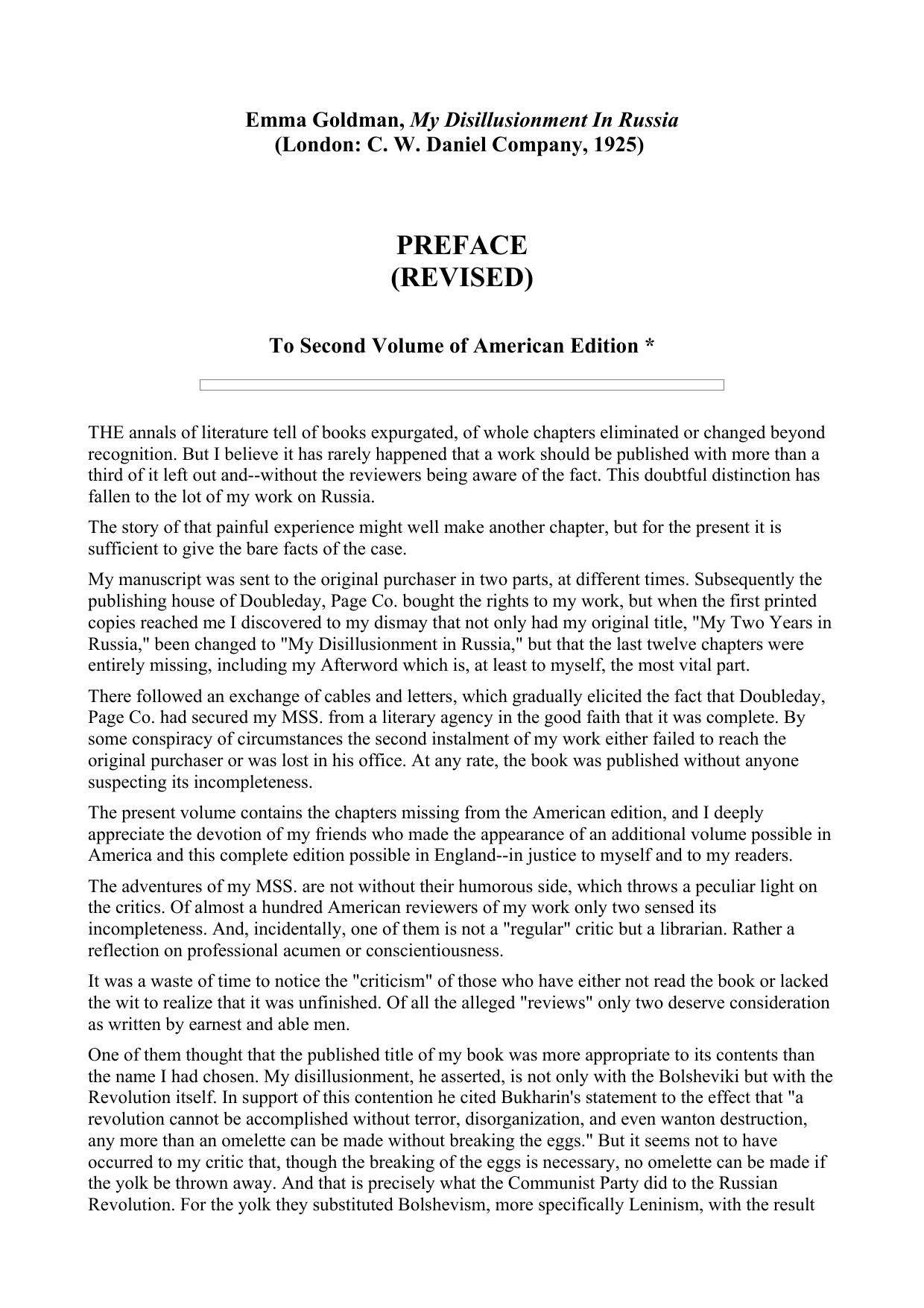My Disillusionment in Russia by Emma Goldman

Author:Emma Goldman [Russia, My Disillusionment in]
Language: eng
Format: epub, pdf
Published: 0101-01-01T00:00:00+00:00
. .
Our visitors spoke of Makhno as a heroic popular figure, and related his daring exploits and the
legends the peasants had woven about his personality. There was considerable difference of
opinion, however, among the Anarchists concerning the significance of the Makhno movement.
Some regarded it as expressive of Anarchism and believed that the Anarchists should devote all
their energies to it. Others held that the povstantsi represented the native rebellious spirit of the southern peasants, but that their movement was not Anarchism, though anarchistically tinged. They
were not in favour of limiting themselves to that movement; they believed their work should be of a
more embracing and universal character. Several of our friends took an entirely different position,
denying to the Makhno movement any anarchist meaning whatever.
Most enthusiastic about Makhno and emphatic about the Anarchist value of that movement was
Joseph, known as the "Emigrant"--the very last man one would have expected to wax warm over a
military organization. Joseph was as mild and gentle as a girl. In America he had participated in the
Anarchist and Labour movements in a quiet and unassuming manner, and very few knew the true
worth of the man. Since his return to Russia he had been in the thick of the struggle. He had spent
much time with Makhno and had learned to love and admire him for his revolutionary devotion and
courage. Joseph related an interesting experience of his first visit to the peasant leader. When he
arrived the povstantsi for some reason conceived the notion that he had come to harm their chief.
One of Makhno's closest friends claimed that Joseph, being a Jew, must also be an emissary of the
Bolsheviki sent to kill Makhno. When he saw how attached Makhno became to Joseph, he decided
to kill "the Jew." Fortunately he first warned his leader, whereupon Makhno called his men together and addressed them somewhat in this manner: "Joseph is a Jew and an idealist; he is an Anarchist. I
consider him my comrade and friend and I shall hold everyone responsible for his safety." Idolized
by his army, Makhno's word was enough: Joseph became the trusted friend of the povstantsi. They
believed in him because their batka [father] had faith in him, and Joseph in return became deeply devoted to them. Now he insisted that he must return to the rebel camp: they were heroic people,
simple, brave, and devoted to the cause of liberty. He was planning to join Makhno again. Yet I
could not free myself of the feeling that if Joseph went back I should never see him alive any more.
He seemed to me like one of those characters in Zola's "Germinal" who loves every living thing and yet is able to resort to dynamite for the sake of the striking miners.
I expressed the view to my friends that, important as the Makhno movement might be, it was of a
purely military nature and could not, therefore, be expressive of the Anarchist spirit. I was sorry to
see Joseph return to the Makhno camp, for his work for the Anarchist movement in Russia could be
of much greater value.
Download
This site does not store any files on its server. We only index and link to content provided by other sites. Please contact the content providers to delete copyright contents if any and email us, we'll remove relevant links or contents immediately.
Waking Up in Heaven: A True Story of Brokenness, Heaven, and Life Again by McVea Crystal & Tresniowski Alex(37783)
Empire of the Sikhs by Patwant Singh(23070)
We're Going to Need More Wine by Gabrielle Union(19032)
Hans Sturm: A Soldier's Odyssey on the Eastern Front by Gordon Williamson(18565)
Leonardo da Vinci by Walter Isaacson(13315)
The Radium Girls by Kate Moore(12013)
Tools of Titans by Timothy Ferriss(8363)
Educated by Tara Westover(8044)
How to Be a Bawse: A Guide to Conquering Life by Lilly Singh(7466)
Permanent Record by Edward Snowden(5829)
The Last Black Unicorn by Tiffany Haddish(5629)
The Rise and Fall of Senator Joe McCarthy by James Cross Giblin(5269)
Promise Me, Dad by Joe Biden(5141)
The Wind in My Hair by Masih Alinejad(5085)
A Higher Loyalty: Truth, Lies, and Leadership by James Comey(4947)
The Crown by Robert Lacey(4805)
The Iron Duke by The Iron Duke(4349)
Joan of Arc by Mary Gordon(4098)
Stalin by Stephen Kotkin(3956)
